
Avoid These Common Node.js Backend Development Mistakes
Introduce the significance of Node.js in backend development and how its popularity has led to an array of common mistakes that developers might overlook.
Dev Orbit
June 23, 2025
Node.js has revolutionized backend development by enabling efficient, scalable, and high-performance applications with its non-blocking I/O and event-driven architecture. However, its widespread adoption has also led many developers to unintentionally fall prey to common pitfalls—from improper error handling to inefficient coding patterns. In this piece, we explore these frequent mistakes and discuss best practices that can elevate your Node.js backend development, ensuring your applications remain robust and performant.
1. Ignoring Asynchronous Nature
Explain the misconception of Node.js as a purely synchronous platform and highlight the importance of handling asynchronous operations correctly, emphasizing the use of callbacks, Promises, or async/await for better code execution flow.
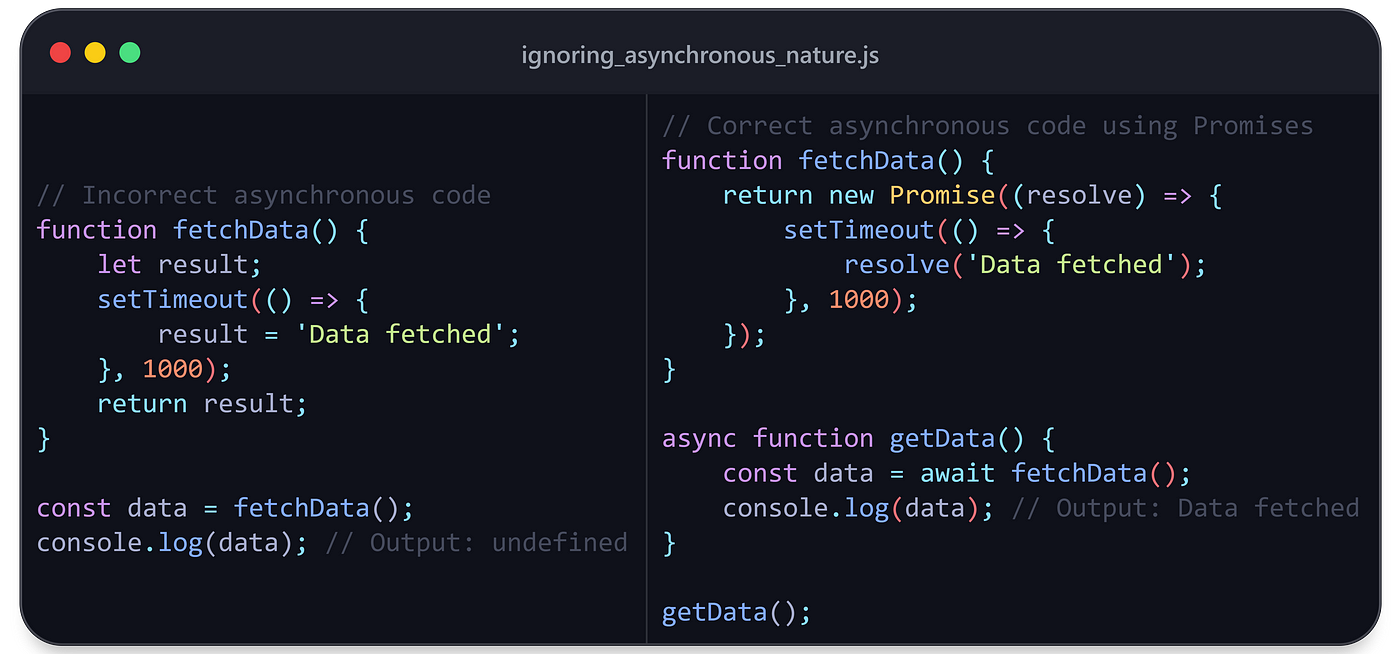
Use callbacks, Promises, or async/await to handle asynchronous operations correctly.
2. Not Optimizing Error Handling
Discuss the oversight of error handling practices, such as not properly handling exceptions or neglecting error-first callbacks, and showcase the impact it can have on code stability and maintainability.
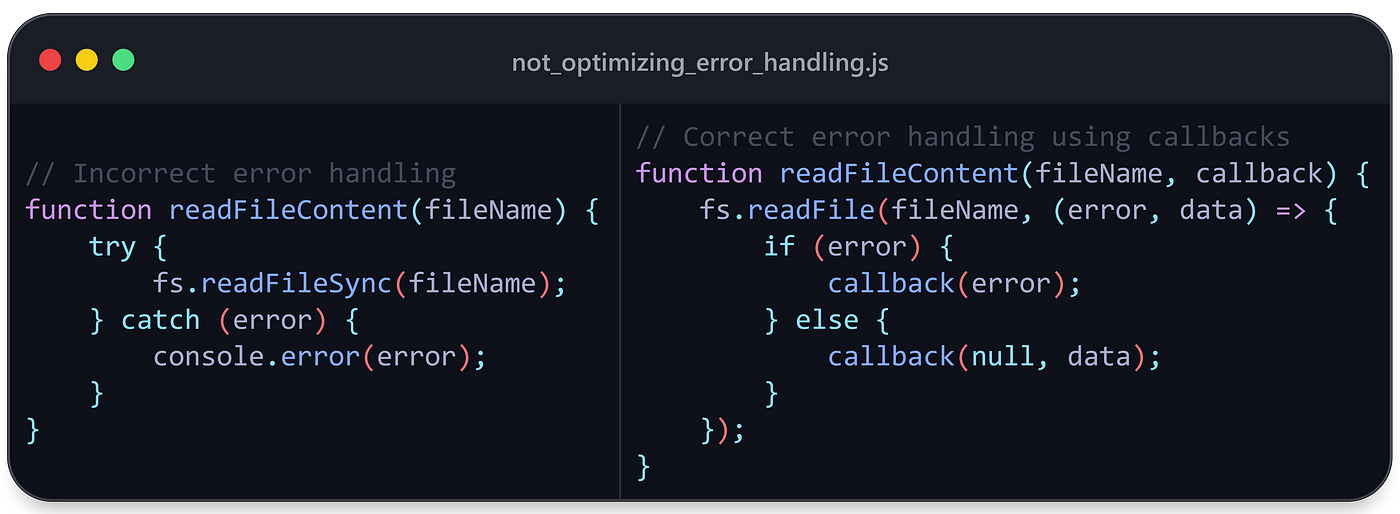
Handle errors explicitly and use error-first callbacks or Promises.
3. Overlooking Memory Leaks
Explain the risk of memory leaks in Node.js applications due to improper handling of references or continuous data accumulation, and suggest strategies like using memory profiling tools or adopting best practices to mitigate these leaks.
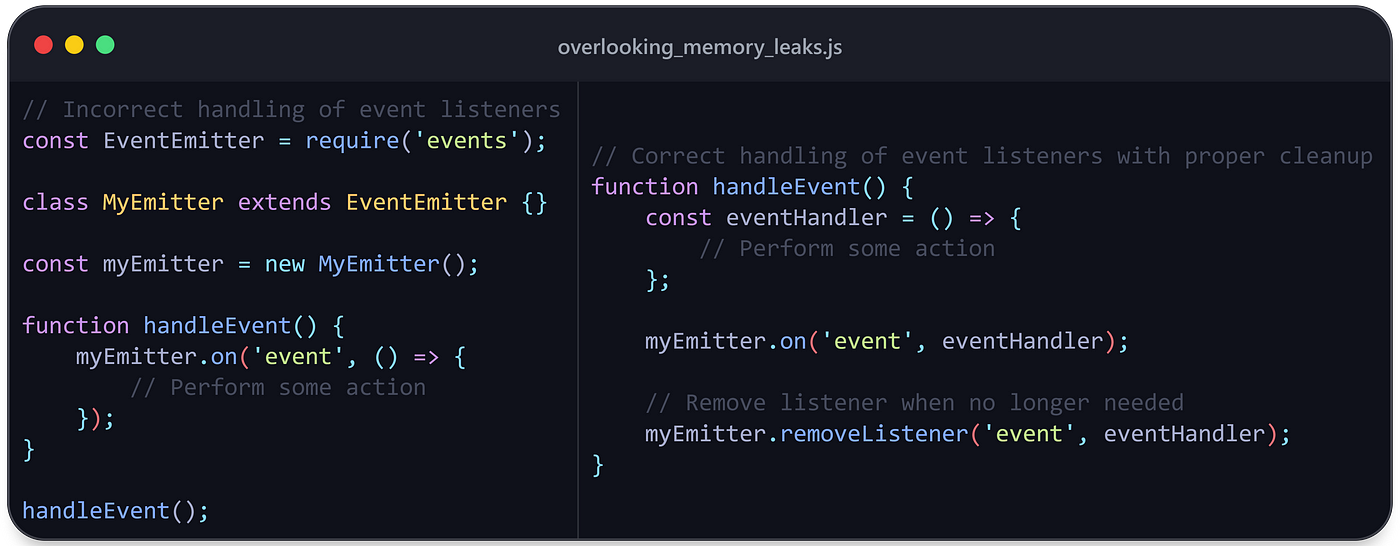
Properly manage event listeners to avoid memory leaks.
4. Poor Scalability Planning
Highlight the mistake of not considering scalability early in the development process, leading to challenges when the application needs to handle larger loads. Emphasize the importance of designing for scalability from the start.
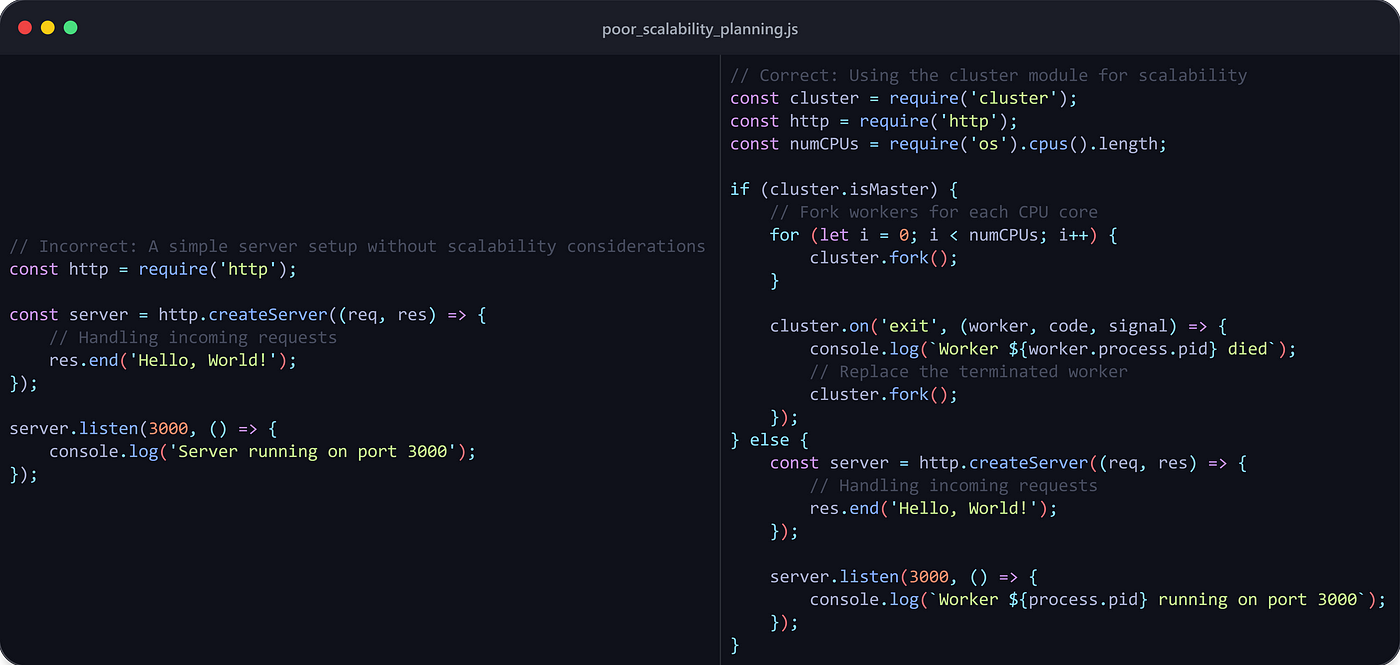
Implement a scalable architecture using a cluster module to take advantage of multiple CPU cores.
5. Lack of Security Measures
Discuss the oversight of security concerns, such as not sanitizing user inputs, not implementing proper authentication/authorization mechanisms, or neglecting secure coding practices, and recommend robust security practices.

Use proper encryption techniques and consider additional security measures.
6. Not Utilizing Caching Mechanisms
Explain the benefits of caching and how neglecting it can lead to reduced performance. Showcase common mistakes in implementing caching or not considering cache invalidation strategies.

Implement caching mechanisms using specialized tools or libraries.
7. Overcomplicating Code Structure
Address the mistake of over-engineering solutions or creating unnecessarily complex code structures, which can hinder maintainability and readability.

Simplify code structure and maintain modularity for better maintainability.
8. Foregoing Testing and Documentation
Emphasize the necessity of thorough testing and comprehensive documentation. Explain how overlooking these practices can lead to more errors and confusion in the long run.
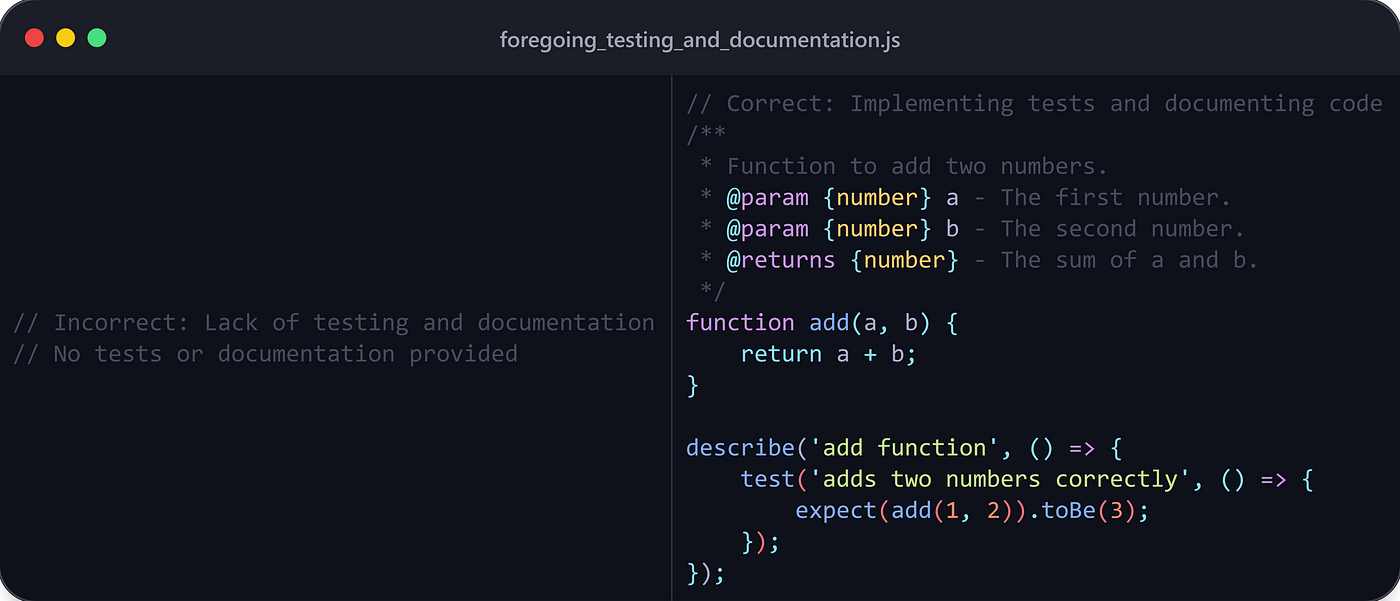
Embrace testing frameworks like Jest and document code using tools like JSDoc.
Conclusion
Summarize the importance of being aware of these common mistakes and provide encouragement for Node.js developers to continuously educate themselves to write more efficient, scalable, and secure backend code.

Enjoyed this article?
Subscribe to our newsletter and never miss out on new articles and updates.
More from Dev Orbit

The Future of Visitor Management: Blockchain and AI empowered OCR
In this evolving technological landscape, visitor management is set to undergo a transformation. Discover how the convergence of blockchain technology and AI-enabled Optical Character Recognition (OCR) can reshape the future of security, efficiency, and user experience in visitor management systems, paving the way for a seamless integration of data and personnel management.

10 Powerful Tips for Efficient Database Management: SQL and NoSQL Integration in Node.js
Streamline your Node.js backend by mastering the integration of SQL and NoSQL databases—these 10 practical tips will help you write cleaner, faster and more scalable data operations.

Tamron 16–30mm F/2.8 Di III VXD G2 for Sony E-Mount Listed for Pre-Order on Amazon US
Discover the latest offering in wide-angle photography with the Tamron 16–30mm F/2.8 Di III VXD G2 lens for Sony E-Mount, now available for pre-order on Amazon US. This article delves deep into its specifications, unique features and its potential impact on your photographic journey. From its advanced optical design to performance benchmarks, we’ll explore everything that makes this lens a must-have for both amateur and professional photographers.

MongoDB Insights in 2025: Unlock Powerful Data Analysis and Secure Your Database from Injection Attacks
MongoDB powers modern backend applications with flexibility and scalability, but growing data complexity demands better monitoring and security. MongoDB Insights tools provide critical visibility into query performance and help safeguard against injection attacks. This guide explores how to leverage these features for optimized, secure Python backends in 2025.

Data Validation in Machine Learning Pipelines: Catching Bad Data Before It Breaks Your Model
In the rapidly evolving landscape of machine learning, ensuring data quality is paramount. Data validation acts as a safeguard, helping data scientists and engineers catch errors before they compromise model performance. This article delves into the importance of data validation, various techniques to implement it, and best practices for creating robust machine learning pipelines. We will explore real-world case studies, industry trends, and practical advice to enhance your understanding and implementation of data validation.

Mistral AI Enhances Le Chat with Voice Recognition and Powerful Deep Research Capabilities
In an era where communication and information retrieval are pivotal to our digital interactions, Mistral AI has raised the bar with its latest upgrades to Le Chat. By integrating sophisticated voice recognition and advanced deep research capabilities, users will experience unparalleled ease of use, as well as the ability to access in-depth information effortlessly. This article delves into how these innovations can transform user experiences and the broader implications for developers and AI engineers.
Releted Blogs

Mastering Git Hooks for Automated Code Quality Checks and CI/CD Efficiency
Automate code quality and streamline your CI/CD pipelines with Git hooks. This step-by-step tutorial shows full-stack developers, DevOps engineers, and team leads how to implement automated checks at the source — before bad code ever hits your repositories.

From Autocompletion to Agentic Reasoning: The Evolution of AI Code Assistants
Discover how AI code assistants have progressed from simple autocompletion tools to highly sophisticated systems capable of agentic reasoning. This article explores the innovations driving this transformation and what it means for developers and technical teams alike.

Handling File Uploads Using Multer In Node Js Express
Web developers must understand how to handle file uploads in the fast-changing world of web development. Multer in Node.js is a robust solution for this task. This article explores Multer features, installation process, advanced functionalities and best practices for seamless integration with Express.

GitHub Copilot vs Tabnine (2025): Which AI Assistant is Best?
AI coding assistants are no longer futuristic experiments—they’re becoming essential tools in the modern developer’s workflow. In this review, we’ll compare GitHub Copilot and Tabnine head-to-head in 2025, exploring how each performs in real-world backend coding tasks. From productivity gains to code quality, we’ll answer the burning question: Which AI assistant should you trust with your code?

Why Most People Waste Their AI Prompts ? How to Fix It...
In the current landscape of AI technology, many users struggle with crafting effective prompts. This article explores common pitfalls and offers actionable strategies to unlock the true potential of AI tools like GPT-5.

Stop Writing Try/Catch Like This in Node.js
Why Overusing Try/Catch Blocks in Node.js Can Wreck Your Debugging, Performance, and Sanity — And What to Do Instead
Have a story to tell?
Join our community of writers and share your insights with the world.
Start Writing